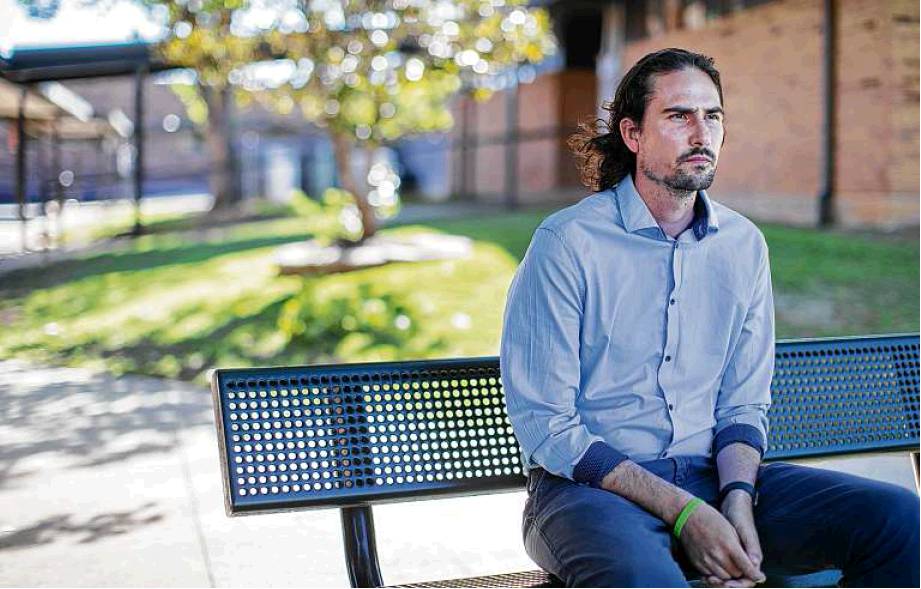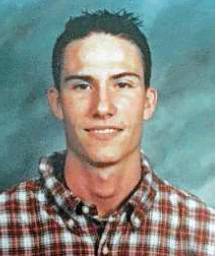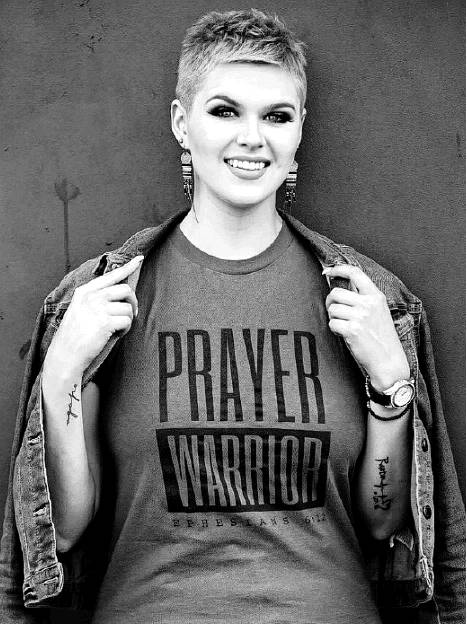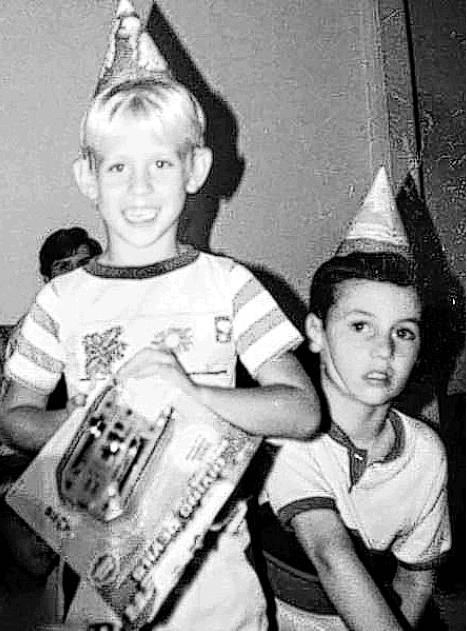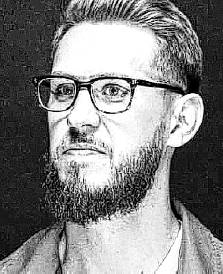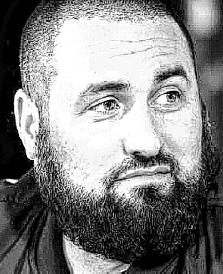HC INVESTIGATION: ABUSE OF FAITH
Baptist abuse victims’ battle: silence, survival, speaking out
Last of six parts
John Tedesco, Lise Olsen and Robert Downen STAFF WRITERS
Dillon Price once lived in a world of secrets and silence. It nearly killed him. The secrets started when Price met Dan Ha-by Jr., a magnetic Southern Baptist preacher in Fort Worth. Price was just a teenager, but he bonded with Haby. He thought they shared a love of God.
Price and other boys spent so much time with Haby that they started staying the night at his house on weekends. Price slept on a couch the first few nights.
Then Haby suggested he sleep on a mattress in his bedroom to be more comfortable. One night, Haby locked the door.
Price didn’t know what to do when Haby — a man he looked up to — began molesting him. Ha-by claimed the acts helped “relieve stress” and made him a better pastor.
Price kept quiet about the recurring abuse for years, even after he left Haby’s church and tried to move on with his life. But he couldn’t escape what had happened. He became suicidal.
“Silence is the worst thing,” said Price. “At the time, I didn’t know anything but silence.”
Price hopes the story of how he finally broke his silence and reported Haby to police can help other survivors of sexual abuse as the Southern Baptist Convention struggles to weed out predators in its 47,000 churches in the United States.
Price and his mother were among 350 people who contacted the Houston Chronicle with their stories of abuse and of predatory behavior by officials based primarily in Southern Baptist churches after the February publication of “Abuse of Faith,” an investigation by the Chronicle and the San Antonio Express-News.
The series revealed that roughly 380 church pastors, employees and volunteers have been credibly accused of sexual misconduct, sued or convicted in criminal cases during the past two decades. They left behind more than 700 victims.
Survivors shared information about other criminal cases as well as abuse that went unpunished. With the help of readers, the Chronicle has identified additional cases that raise the number of those credibly accused to more than 400 — and added 45 criminal cases involving Southern Baptist church leaders and volunteers to our searchable online database. It now includes convictions or plea deals involving more than 260 offenders.
Many survivors who contacted the Chronicle said they had felt alone until they read the articles.
Kingsley Brown reached out after spotting her father and abuser — a charismatic former Waco pastor named William Frank Brown — in a photo collage of offenders convicted of sex crimes.
“In these types of situations, a lot of people want to blame the church and turn away from the church and blame the Lord, and it is so easy for that to happen,” she said. “Our whole purpose is that this is an issue that needs to be addressed — it’s OK for you to come forward.”
Breaking taboos
Kingsley Brown was only 14 in March 2009 when a counselor called her to the school office, where Child Protective Services workers were waiting. Outwardly, Kingsley was a success —a popular A student. But she carried a secret: Her father began molesting her when she was 10 and continued to do so for two years. Though Kingsley followed his command to never tell anyone, her sister had eventually guessed.
At the time, her father was lead pastor of Bellmead Baptist Church, a Waco congregation with 1,300 members.
She broke down in the circle of school and state officials, wondering if revealing her father’s abuse now held the power to ruin their entire family. She felt intense shame, guilt and confusion as she repeated the story of serial incest to police and prosecutors.
Her father was immediately removed from the home. He was indicted, and he later confessed — and Waco newspapers ran the story on their front pages.
Kingsley was not alone as an incest survivor of a Southern Baptist preacher or leader, though she didn’t know it then. The Chronicle’s database includes about two dozen cases of incest involving church leaders. Nearly all of the cases are similar to Kingsley’s, in which pastors and other trusted church figures were prosecuted for allegedly molesting or raping their own children or other relatives.
For Kingsley’s family, the initial consequences were devastating. Her father went to prison. Both parents lost their jobs. Her mother, Connie, had been serving as an associate pastor alongside her father but could not stay because of the scandal and couldn’t become pastor of the church because churches can be expelled from the SBC for employing female pastors. The Browns divorced.
In 2009, William Brown pleaded guilty and was sentenced to 50 years in prison on four counts of aggravated sexual assault of a child. Kingsley later cut off all contact with her father for her own mental health.
In the aftermath, church leaders, many of whom did not know that Brown’s daughter was his victim, failed to provide comfort or support to the family, Connie Brown says. Both Kingsley and her mother are no longer Southern Baptists but say they never lost their faith. Kingsleyworks as a faith-based speaker and part-time model in Atlanta. Her mother founded a nonprofit and still preaches.
“There’s a lot of damage that you have to pick up from what occurs after abuse like that, so it’s important to be able to speak on restoration and healing,” Kingsley said.
They both talked to the Chronicle in hopes of inspiring others with a positive message: Incest and abuse do not have to destroy you. They say breaking taboos by sharing that experience with authorities, with trusted friends, with God and with the right counselors can be a path to a better future.
“We know the freedom that comes on the other side, and we are anxious to help other people through it,” Connie Brown told the Chronicle.
Abuse goes unpunished
Other survivors of abuse wrote about predators who remain in the pulpit. Several expressed in interviews how hard it has been to see the people who hurt or raped them go unpunished and continue preaching. They shared stories of abuse that occurred years or even decades ago.
One Texas woman wrote about how she was only 12 when a popular young preacher’s son saw her walking by his house on a hot day and invited her inside for a Coke. He raped her on the floor of his house. He explained it was “something he’d helped some of my friends with” — special treatment he gave only certain girls. Her family belonged to his father’s Texas-based Southern Baptist church. She never told anyone.
Years later, as a successful business executive, she began speaking to teenagers about her struggle to overcome the pain and shame of sexual abuse. She asked not to be identified in this story because she fears going public would identify her abuser, who was never prosecuted, and upset her elderly father. But she still wonders if her popular attacker later harmed others when he became a church leader himself.
Other survivors filed civil lawsuits that exposed pastors who abused their counseling roles to seduce and abuse adult women. These women didn’t want to reopen old wounds by speaking publicly, but they emphasized that pastors who abuse adults remain more likely to get away with misconduct or crimes than child abusers. Very few cases the Chronicle tracked involving abuse of adults resulted in criminal charges.
Several victims who have become strong advocates for change in Southern Baptist churches are among those who say they were denied justice — including best friends Kenny Stubblefield and Brooks Hansen, whose alleged abuser was never punished because they went to police too late for prosecution. The statute of limitations had expired in Tennessee, where they grew up.
Stubblefield still remembers every inch of that basement in Memphis: the shag carpet. The fridge full of Michelobs. The big-screen TV with porn playing. The waterbed, where at 16 he slept at the insistence of his youth pastor. The black window curtains, and the way the sunrise bled through them as he sat, paralyzed with fear, in the early morning hours after he said he was molested in November 1996.
For the next year, he lived “in the shadows,” he said in a recent interview. At the time, he thought: “I am by myself. … I am alone. Nobody will protect me.”
Then his best friend, Hansen, told him about his own night in their youth pastor’s basement. Hansen’s older brother had asimilar story.
All three eventually went to the church’s lead pastor, Scott Payne, who said he would act. The youth pastor was back at the church months later, the men said. Stubblefield said they were told to stay quiet, because that “was what the faithful did.”
“The abuse was horrendous,” Stubblefield said. “But the most damaging, life-altering part of the entire process was when the people I trusted — that I thought I could trust, that had my back, that were supposed to protect me — absolutely re-victimized me. It was like a gunshot wound in my gut.”
Despite knowing Tennessee’s statute of limitations had expired, the men filed a police report in 2016 after learning their alleged attacker still worked with schoolchildren at a Memphis library. The alleged attacker was investigated by police, who took no action. The city of Memphis said in a statement that the district attorney had declined to prosecute “due to the statute of limitations” but said the employee, Chris Car-wile, was “no longer employed by the city of Memphis.”
Neither Carwile nor Payne could be reached for comment. Payne previously has denied telling Stubblefield and Hansen to stay quiet and has said he believed the families were satisfied when he fired Carwile from the church.
Stand Up, Speak Out
In Fort Worth, it took Dillon Price adecade to break his silence and talk openly about what his pastor did to him.
The decision was incredibly difficult. By then, Price had attended seminary and earned acollege degree. He was no longer under Ha-by’s direct control.
But Price’s family knew Haby. They liked him. Many of his friends admired the pastor. Price knew there could be a backlash: “You might lose friends, you might lose people around you that don’t believe you for whatever reason.”
Haby, now a registered sex offender, did not respond to awritten request for comment.
Price, now 34, said he came to realize that secrets and silence were part of the tools Haby used to abuse him. He like that staying silent was allowing Haby to control his life. And he was worried Haby might be abusing others.
Price finally told his family the truth. Most of his relatives were shocked and angry, but nearly all believed him. One of Price’s uncles sided with Haby and to this day won’t speak to Price.
Price reported Haby to police in 2014 — about 14 years after Haby began molesting him. Price said that when a Fort Worth police detective called and told him that Haby had been arrested, he felt free for the first time in years.
Two more men stepped forward and said Haby had abused them in their youth. Haby initially fought the charges, and the case went to trial. Haby reached a plea deal with prosecutors that allowed him to avoid prison time, but he had to admit his crimes and become a registered sex offender.
Price went from suffering in silence to writing a book about recovering from his abuse. He now attends a new church in Fort Worth. He has become a teacher, a father and a coach and founded a ministry called Stand Up, Speak Out to talk openly about what happened to him. He especially wanted to increase support for male victims of clergy abuse, who tend to feel particularly isolated, he said.
“It’s just so crazy that we don’t have these conversations,” Price said.
Talking about sexual abuse is awkward and painful, he acknowledged, but talking about it helps churches learn how to prevent it.
If more people understood predatory behavior, he said, they would have asked why Haby was routinely spending so much time alone with Price when he was just a 15-year-old boy.
That’s not normal, Price said. But no one in his family or in his church knew enough about the problem to voice any suspicions.
“Whether it’s in a church, whether it’s in school, no matter what organization we’re talking about, as long as there’s conversations not happening, predators are finding their foothold,” Price said. “And they’re going to continue to weasel their way in there.
“Because that’s what they do.” john.tedesco@chron.com lise.olsen@chron.com robert.downen@chron.com
» To view video and to search our expanded database of sexual offenders, go to: HoustonChronicle.com/AbuseofFaith The series
June 2: Quiet trouble with missionaries
Wednesday: Knowing, and still hiring
Today: More victims speak
